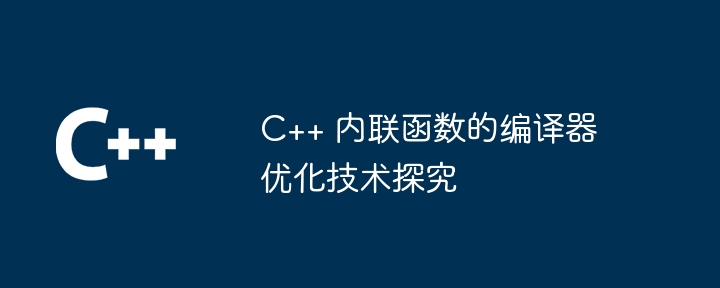
Compiler optimization techniques for inline functions include: Function inlining: Copy the inline function code to the call point to eliminate function call overhead. Template instantiation: Instantiates a version of an inline function that matches the call site type. Loop unrolling: Unroll inline functions containing loops to eliminate loop overhead. Code movement: Move inline function code to other program parts to reduce branch prediction overhead.

Research on compiler optimization technology of C inline functions
Introduction
Inlining functions is an optimization technique supported in most compilers that allows function calls to be replaced with their code, thus eliminating function call overhead. This can significantly improve program performance, especially when the function is called frequently.
Compiler optimization techniques
The compiler uses the following techniques to optimize inline functions:
Practical case
Consider the following C code snippet:
inline int sum(int a, int b) {
return a + b;
}
int main() {
int x = sum(1, 2);
int y = sum(3, 4);
return x + y;
}The compiler can inline the sum function Go to the main function and generate the following optimized code:
int main() {
int x = 1 + 2;
int y = 3 + 4;
return x + y;
}This eliminates the calling overhead of the sum function and improves program performance.
Conclusion
Inline functions are an effective optimization technique to improve program performance. The compiler optimizes inline functions using techniques such as FI, TI, LU, and CM to reduce function call overhead, loop overhead, and branch prediction overhead. When considering using inline functions, you should weigh the performance gains against factors such as code size and maintainability.
The above is the detailed content of Research on compiler optimization technology of C++ inline functions. For more information, please follow other related articles on the PHP Chinese website!
 What is an inline function
What is an inline function
 What are the differences between c++ and c language
What are the differences between c++ and c language
 Recommended learning order for c++ and python
Recommended learning order for c++ and python
 Cost-effectiveness analysis of learning python and c++
Cost-effectiveness analysis of learning python and c++
 Is c language the same as c++?
Is c language the same as c++?
 Which is better to learn first, c language or c++?
Which is better to learn first, c language or c++?
 The difference and connection between c language and c++
The difference and connection between c language and c++
 C++ software Chinese change tutorial
C++ software Chinese change tutorial




